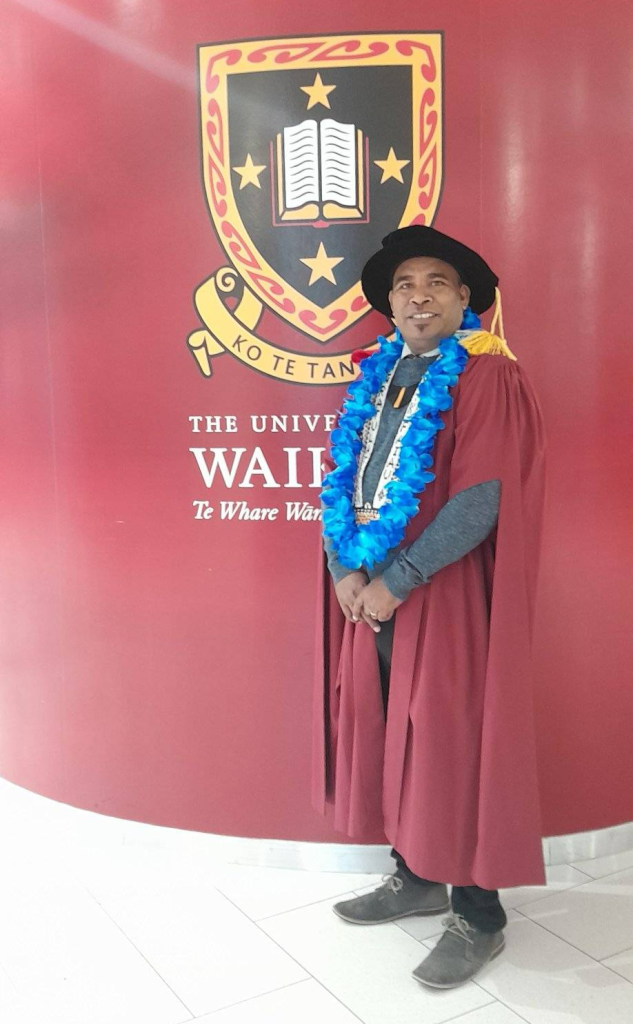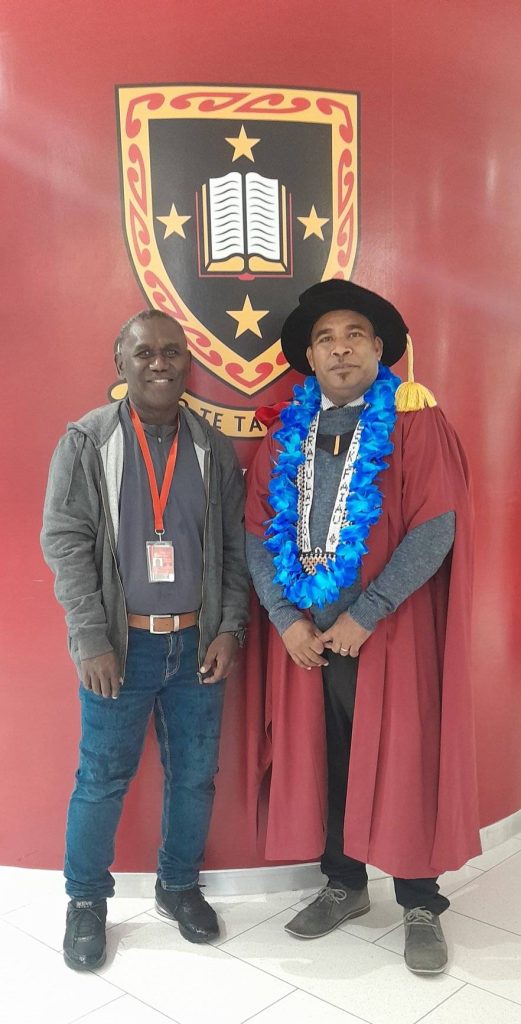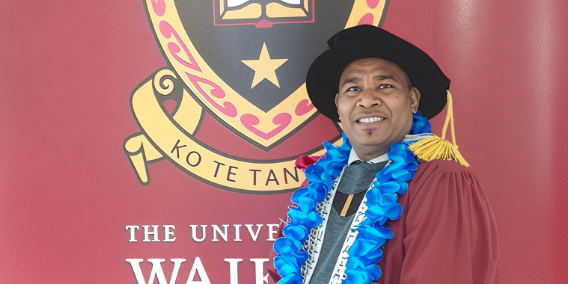Dr James Kwaimani Faiau from Baelelea-To’abaita in North Malaita graduated with a Doctor of Philosophy (PhD) in Anthropology this week.
James’s PhD journey is a personal story of sacrifice, persistent, faith and triumph. Nothing comes without sacrifice and keep trying to be better each time.
Here he shares his remarkable education journey and achievement.
A choice one makes in life one takes have are taken with intentionality and dedication. This was one path I willed myself to follow.
It becomes possible connecting with the right people – peers, academic and spiritual mentors and advisors.
I feel humble and carry the weight of history and responsibility – my nation, tribe, people and family including those who have passed on and generations to come, like others to inspire and leave a legacy.
To want to make impact and inspire not with power and money, but with self-belief and undeterred quest for education – the “creation of knowledge” from a Pacific/Melanesia-Solomon Islands’ worldview rooted on stories, relationality and faith.
I feel the weight of history and with humility for my family, tribe and people this Doctor of Philosophy (PhD) degree was the first from Baelelea-To’abaita. And pleasing that achievement has inspire and contribute to our Solomon Islands.
All praise and glory to God Almighty for in Him is the source of wisdom, knowledge and understanding. For without God, dreams and human efforts are meaningless and less unfulfilling.
The achievement is a culmination of four years painstaking work that include 6 (in fact 18 months) ethnographic fieldwork in the inland villages in West Baelelea that resulted in a 247-page.
My PhD thesis titled: Oli Aenaguri’ai: An ethnography of social-ecological relations and contemporary changes in Baelelea inland communities on Malaita, Solomon Islands.
The title speaks of both my personal-scholarly journey back to my roots – culture and people, and secondly a theoretical construct – or Indigenous Baelelea perspective dynamics of social-ecological relations and development.
I use the Baelelea metaphor Oli Aenaguri’ai – translated ‘Return to the tree root’ – or simply ‘Return to the root’ in part to describes my positionality as Indigenous Baelelea researcher’s scholarly journey back ‘home to my root’ to immerse, seek and document aspects of culture, people’s worldview, beliefs and traditional ecological knowledge.
In doing so, reclaim our identity and Indigenous knowledge and contribute to the “global knowledge economy”.
As a theoretical construct, Oli Aenaguri’ai is about rethinking – or philosophising about development to that which is rooted in Indigenous worldview and ontology.

In Baelelea, myths and beliefs underscore our traditional-spiritual knowledge and orientation and/or deep consciousness of humans as part of nature. This defines in what environmental anthropologists described as “one living organism” interconnected through “web of life” and concepts as ‘kincentric ecology’ that plants, animals – or non-human other beings are our ‘relatives’ – spirits and embodiment of our ancestors.
In exploring this body of knowledge from anthropological and Indigenous lens provide deed understanding and knowledge that can inform better policies and more resource on sustainable land/ecosystem management and development intervention rooted on traditional and spiritual knowledge.
My Oli Aena’guri fieldwork gained the benefit of being a local myself. As one may note anthropological-ethnographic fieldwork may take years. University grant and policy permitted me 6 months.
The Covid-19 was a blessing in disguise, resulted in suspension of scholarship, but at the same time permitted prolong stay on Malaita for further 12 months without any funds.
I benefited by living and moving between villages and Auki where the family resides. The designed locality of my fieldwork is in West Baelelea in a collection of inland villages known as Alafana – with population of 300+ people all Baelelea speakers with extended historical and family connections to neighbouring North Malaita linguistic groups, including To’abaita, Lau, Baegu, and Fataleka and Kwara’ae.
Tell me about yourself?
I am the eldest of three siblings. My late father is from Usuilangi tribe in Baelelea, and late mother is from Fani’ili/Ai’nigaule tribe of To’abaita also in North Malaita.
I was born and raised in Baelelea as a ‘bush kid’ in remote mountain village of Alelengana in North Malaita.
I did not attend school proper until the age of 12 years when I went to live my foster parents in another village – not in my native Malaita but on Ghizo Island in the Western Province.
From 1986 to 1995 my parents served as SSEC missionary in the Western Province. And that is when I first attended Titiana Primary School outside of Gizo Town.
Two years from 1990 – 1991 I attended Suava Primary School on Rannoga Island where my parents moved to serve as missionary.
From 1992-1993 back at Titiana Primary School to complete Grade 5 and Grade 6. At the end of 1993 was amongst 4 students passed out from a class of 28 students.
And was one of only two students, I could recall from Western Province schools in that year (1994) to have secured Form One placement at KGVI.
I was already into my Form 3 at King George VI Secondary school when my parents retired from missionary work from the Western Solomon and returned back to Malaita.
But we continued to regard West as our second home, and for me is where my education brings.
I completed secondary school at KGVI – having served as School Head Boy and School Captain in my last two years of senior secondary.
I pushed myself beyond my limits to progress academically amongst the “top of the cream” having served as student leader.
I cultivated sense for leadership and scholarship inspired by the KGVI school motto: “Leadership and Scholarship”.
From 2002 to 2004 I was given a Solomon Islands government scholarship to pursue Bachelor of Education majoring in History/Politics at University of the South Pacific in Fiji. It was a breakthrough and a milestone really, being the first from my tribe to have pursued and graduated with a university degree in 2005 from USP.
It was a humbling journey and breakthrough and pleased to have inspire many others from my tribe and region who followed suit in later years and the years to come.
Anything that inspired you?
I remembered and took to heart a word of knowledge from my USP university professor of education that “education is a lifelong process” that to me means not limits to pursuing further post-graduate qualification(s) of your dream and passion.
One has to be intentional and perhaps prepare to sacrifice – time, effort, comfort, money, etc.
Another word that inspired and propels my scholarly journey to come this far. My Pacific history lecturer at USP, Professor Stewart Firth penned these very words having given me a B+ mark on one of my essays: “James, this is a fine piece. You can go a long way!” These ‘gold nuggets’ inspired and stack in me for life.
My advice, in the pursuit of knowledge and success in academic and life. Words of a wise man are wisdom, and it builds. But careless mouths are poison and destroy your life and intended success.
To be successful and go a long way in life – embrace words of knowledge, either in the classroom, church, social conversations (including social media) and with village elders and youths, even kids.

Any person who inspires you the most?
A lot of people really but allow my family bias. My late father, a converted christian from Usuilangi tribe in Baelelea.
I dedicate this achievement in his honour for his passion about education and being a key informant.
Unfortunately, he could not live to witness this moment as he passed on in March of 2022. Nevertheless, his shared wisdom echo on the pages of the thesis on subjects of Baelelea traditions and ecological knowledge.
Vividly remembered. In the course of encouraging me to attend school by going to live in another village, he casually posed: “Son, go to school to help me read the Bible better”.
As a 2-year boy, I couldn’t understand and dispute. I understood later his seriousness and honesty as converted Christian and missionary worker who never attended school.
It was truly a blessing to come this far in my quest for reading of not just the Bible – but as a learned Solomon Islands scholar from Baelelea-To’abaita.
Where your family part of the journey?
My family is my biggest motivation. Being a scholar and father is no easy feat, especially coming through the COVID-19 pandemic – and travelling back and forth between Solomon Islands and New Zealand.
Huge huge credit and thanks to my wife Sandy, and children – James Junior, Emma, Rhona and Eliana.
I graduated with a PhD, but your forbearance and resilience made me strong and not allow mediocre of quitting at challenging junctures of the journey.
For record, I commenced my PhD candidacy in 2019 when my two eldest daughters started secondary education and now graduated when they started University.
Also, into three months of my PhD journey and my youngest daughter Eliana was born. She will celebrate her 6th birthday the coming week. What a journey of endurance, faith and favour of God Almighty.
Any final word?
Thanks to countless family, friends, former work colleagues. My amazing PhD supervisors Dr Fraser Macdnoald and Associate Professor Fiona McCormack and mentors at University of Waikato and around the world.
Thanks to the NZ Government for through Manaaki Scholarship I graduated with this PhD qualification and the previous qualifications.
Currently work as one of the advisers at The Pacific Community (SPC) Land Resource Division on crosscutting issues and development needs of the Pacific Islands Countries and Territories – including Solomon Islands.
Already try to foster collaboration with SINU, USP, and others research institutions and collaborators on research projects with country and regional scope.
And specific want to building on research work in Baelelea started with a monograph that will need collaboration and assistance.
Lastly let me end with this grand project quoting Professor David Gegeo: ‘Pacific and Solomon Islands have attained political independence, but the outstanding decolonisation project or frontier is intellectual decolonisation’ (paraphrase). Unpack yourself reading this.
<<<<<<<<<<>>>>>>>>>>>>









